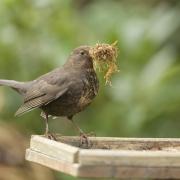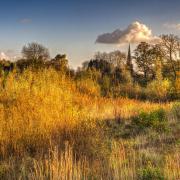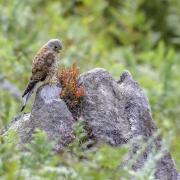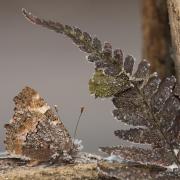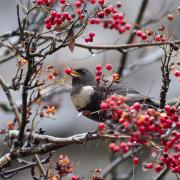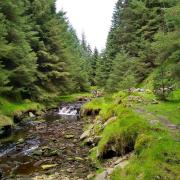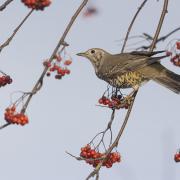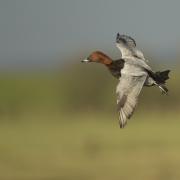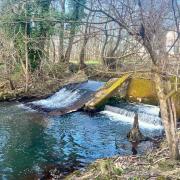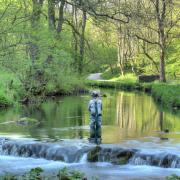Paul Hobson rejoices in the best free concert you will ever hear

As I grow older I definitely feel that I am mellowing. When I was a youth every spring I would spend weeks learning new bird calls and songs. This was primarily to help me locate birds so that I could spot them more easily with my binoculars. I can’t really remember if I actually enjoyed the songs for their own sake. I imagine I liked them, but it was certainly nothing near the extent that I relish hearing birdsong today.
The dawn chorus is one of the most fantastic, free concerts anyone can experience. It actually occurs to a limited extent all year round but the main event is scheduled for spring. Some birds are tuning up in March. Blackbirds, song and mistle thrushes will start to stretch their vocal chords then but, like any new musician, they can take quite a while before they learn the intricacies of their complex songs.
By April they should be in full song and voice, and as the showery month progresses more choristers join the orchestra. By the beginning of May, when the summer migrants have returned, the volume and score are at their finest and ticket prices the highest.
To enjoy this incredible event you have to get up early and choose which orchestra you fancy listening to. The best dawn choruses are usually in woodlands but scrubby areas where whitethroats and blackcaps serenade are also worthy of a few early mornings away from your cosy, warm bed.

Some habitats might not have the auditory variety of woodlands. The orchestras of marsh and reed beds are smaller but they have their own, unique sopranos such as reed and sedge warblers. These two have similar songs that are long and so varied they can delight you for hours. If you can find an area of mixed habitats, such as at Carr Vale, you can maximise your experience and have one of the greatest mornings ever.
The dawn chorus starts early, well before sunrise. By May this means waking at a seriously early time but the effort is well worthwhile. When I was a lecturer I used to take my class out to Padley Woods every year to listen to the dawn chorus. It’s not hard to imagine the groans and comments when I told them I would pick them up in the mini bus at 3.30am! By four o’clock we would be listening to the loud, aggressive song of wrens competing with the liquid notes of blackbirds. A background of chaffinches would be punctuated with pied flycatchers, various tits and the delightful songs of redstarts. The higher pitched but much quieter songs of tree creepers and goldcrests were much harder to distinguish.
By then the groans had given way to awe and fascination. They were hooked. The bacon butties for breakfast tasted incredible and certainly felt well earned.
Two of the most frequently asked questions are: ‘Why do birds sing so intensely at dawn?’ and ‘Why do they start singing in the dark?’ There are a number of answers. Spring is about establishing a territory and seeking a mate. The male birds do this by song. The most successful have the most varied repartee. The idea is that this signals that they have a better territory with more food so they are fitter and thus sing better.

Not all birds start singing at the same time. Some, for example robins, begin incredibly early. They are often followed by blackbirds with others joining in later. They use this twilight zone for two reasons. First it signals to their mate, or potential mates, and to rival males that they made it through the night and are fighting fit. The second reason is that they can’t really feed effectively in the low light levels so use it to sing strongly instead. The males will carry on singing throughout the day but never with the same energy and intensity as at dawn.
Modern research has started to uncover some amazing facts about the dawn chorus. It has been known that every bird, like us, has a unique voice (song) and that they can recognise individuals. It seems that the dawn chorus is a social event and the birds may be establishing relationships with other males. It has been suggested that they may even sing individually to each other in turn and the cacophony that we love is actually a complex set of targeted songs.
Most birds’ songs are recognisable across the UK but even within our islands birds show regional accents. Derbyshire’s chaffinches have a very different accent to Scottish ones! So over time they continually develop their songs, they are definitely not static. Some birds are great mimics. In Britain our greatest is the starling which can incorporate an amazing array of other birds’ songs into its own. The theory is that the more it does this the more attractive it is to its mate. In Scotland some starlings have even copied the bleating of sheep and in urban areas a few use car horn sounds to add variety.
Another question that is sometimes asked is, ‘Do the birds actually enjoy singing?’ There is no known answer to this – there are many debates as to whether or not birds have emotions. However, some research does suggest that this might actually be so. Birds do not do all things by instinct alone, some behaviours are impossible to explain and perhaps we misjudge them somewhat if we continually consider them merely pre-programmed robots. I would love to think that birds might actually enjoy singing.
It is hard to drag yourself out of your warm, cosy bed well before the sun gets up but the rewards are incredible and if you take a small flask and stool with you it can become the highlight of your week. Let this spring be the time you are drawn into experiencing one of nature’s stunning free orchestral events!




